新概念英语第一册第1课 Excuse me
- 格式:pptx
- 大小:2.59 MB
- 文档页数:32
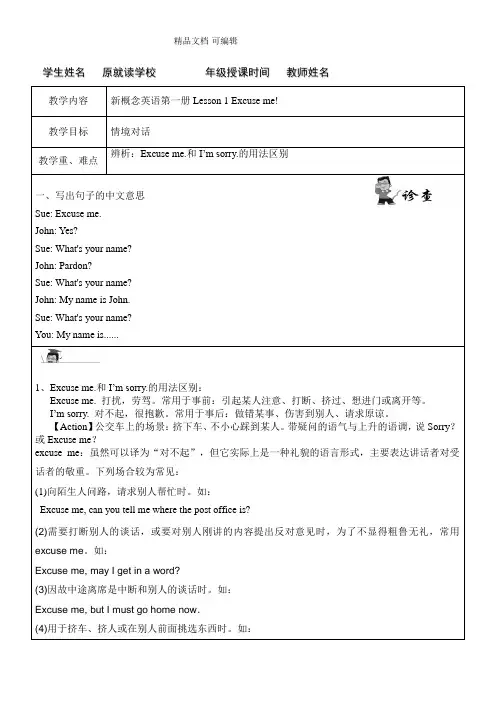
学生姓名原就读学校年级授课时间教师姓名教学内容新概念英语第一册Lesson 1 Excuse me!教学目标情境对话辨析:Excuse me.和I’m sorry.的用法区别教学重、难点一、写出句子的中文意思Sue: Excuse me. __________________John: Yes? __________________Sue: What's your name? __________________John: Pardon? __________________Sue: What's your name? __________________John: My name is John. __________________Sue: What's your name? __________________You: My name is...... __________________1、Excuse me.和I’m sorry.的用法区别:Excuse me. 打扰,劳驾。
常用于事前:引起某人注意、打断、挤过、想进门或离开等。
I’m sorry. 对不起,很抱歉。
常用于事后:做错某事、伤害到别人、请求原谅。
【Action】公交车上的场景:挤下车、不小心踩到某人。
带疑问的语气与上升的语调,说Sorry?或Excuse me?excuse me:虽然可以译为“对不起”,但它实际上是一种礼貌的语言形式,主要表达讲话者对受话者的敬重。
下列场合较为常见:(1)向陌生人问路,请求别人帮忙时。
如:Excuse me, can you tell me where the post office is?(2)需要打断别人的谈话,或要对别人刚讲的内容提出反对意见时,为了不显得粗鲁无礼,常用excuse me。
如:Excuse me, may I get in a word?(3)因故中途离席是中断和别人的谈话时。
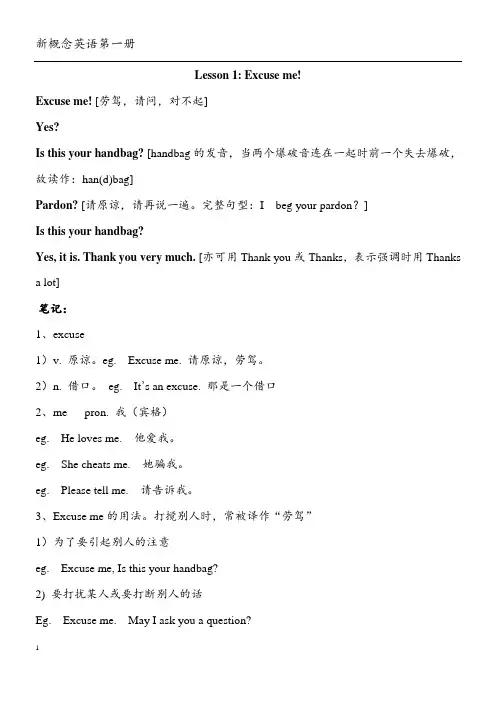
Lesson 1: Excuse me!Excuse me! [劳驾,请问,对不起]Yes?Is this your handbag? [handbag的发音,当两个爆破音连在一起时前一个失去爆破,故读作:han(d)bag]Pardon? [请原谅,请再说一遍。
完整句型:I beg your pardon?]Is this your handbag?Yes, it is. Thank you very much. [亦可用Thank you或Thanks,表示强调时用Thanks a lot]笔记:1、excuse1)v. 原谅。
eg. Excuse me. 请原谅,劳驾。
2)n. 借口。
eg. It’s an excuse. 那是一个借口2、me pron. 我(宾格)eg. He loves me. 他爱我。
eg. She cheats me. 她骗我。
eg. Please tell me. 请告诉我。
3、Excuse me的用法。
打搅别人时,常被译作“劳驾”1)为了要引起别人的注意eg. Excuse me, Is this your handbag?2) 要打扰某人或要打断别人的话Eg. Excuse me. May I ask you a question?3) 向陌生人问路Eg. Excuse me. Could you please tell me the way to the railway station? 劳驾,请问去火车站的路怎么走呢?4) 向某人借东西Eg. Excuse me. Can I borrow your pen? 打扰下,可不可以接你的钢笔用下啊?5)需要从别人身边挤过或让别人给自己让路Eg. Excuse me. Could you please make some room for me? 劳驾,借过下一下。
6)要求在宴会或会议中途中离开一会儿Eg. Excuse me. May I leave for a little while? 对比起,我离开一下。
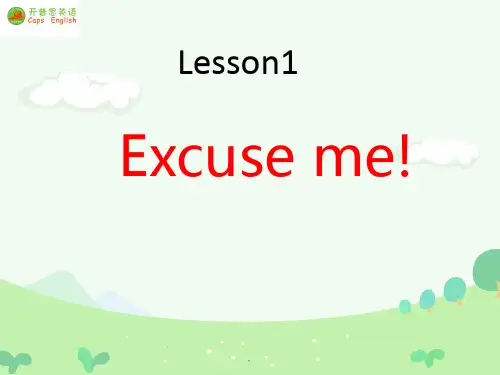
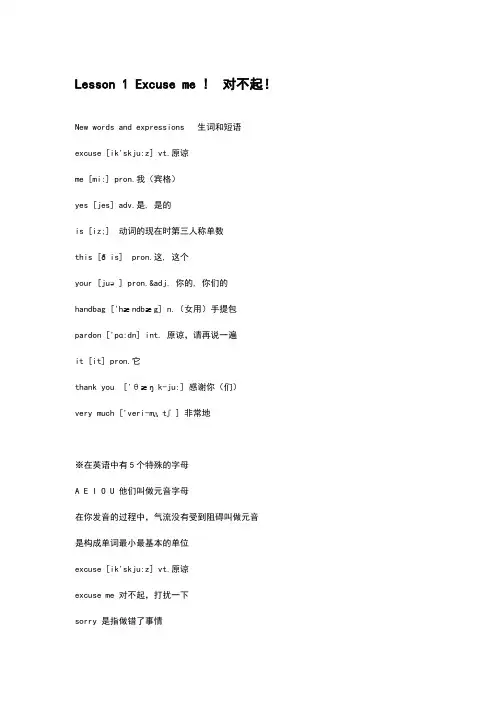
Lesson 1 Excuse me ! 对不起!New words and expressions 生词和短语excuse [ik'skju:z] vt.原谅me [mi:] pron.我(宾格)yes [jes] adv.是, 是的is [iz;] 动词的现在时第三人称单数this [ðis] pron.这, 这个your [juə] pron.&adj. 你的, 你们的handbag ['hændbæg] n.(女用)手提包pardon ['pɑ:dn] int. 原谅,请再说一遍it [it] pron.它thank you ['θæŋk-ju:] 感谢你(们)very much ['veri-mʌtʃ] 非常地※在英语中有5个特殊的字母A E I O U 他们叫做元音字母在你发音的过程中,气流没有受到阻碍叫做元音是构成单词最小最基本的单位excuse [ik'skju:z] vt.原谅excuse me 对不起,打扰一下sorry 是指做错了事情而其他的场合,为了引起话题,想询问,或者让路,用excuse me excuse n.借口, 理由, 饶恕, 致歉Eg:It is the excuse for him to eat the apple.这就是他吃苹果的借口Please excuse me for opening the door .请原谅我把门打开了。
介词后面要+doing(for about)me [mi:] pron.我(宾格)e的前面没有其他元音字母的时候,e发本身音放在动词和介词的后面做宾语Look after me 照顾我Can you help me 你能帮助我么Let me help you 让我帮助你吧yes [jes] adv.是, 是的他的反义词是noy常见的发音有3种 fry[frai] sorry['sɔri]Are you a teacher 你是一名老师么Yes,I am 是的,我是No,I am not 不,我不是Aren’t you a teacher 你不是一名老师么Yes,I am 是的,我是No,I am not 不,我不是Aren’t you a teacher 你不是一名老师么No. i am a doctor.不。
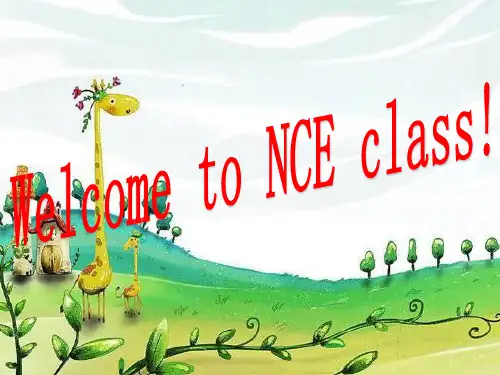
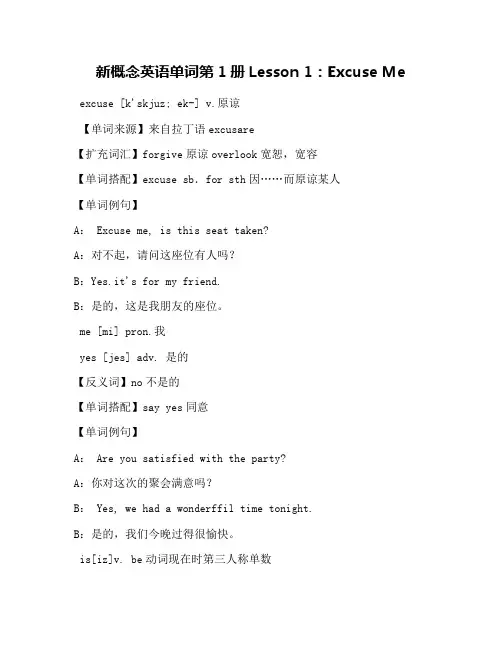
新概念英语单词第1册Lesson 1:Excuse Me excuse [k'skjuz; ek-] v.原谅【单词来源】来自拉丁语excusare【扩充词汇】forgive原谅overlook宽恕,宽容【单词搭配】excuse sb.for sth因……而原谅某人【单词例句】A: Excuse me, is this seat taken?A:对不起,请问这座位有人吗?B:Yes.it's for my friend.B:是的,这是我朋友的座位。
me [mi] pron.我yes [jes] adv. 是的【反义词】no不是的【单词搭配】say yes同意【单词例句】A: Are you satisfied with the party?A:你对这次的聚会满意吗?B: Yes, we had a wonderffil time tonight.B:是的,我们今晚过得很愉快。
is[iz]v. be动词现在时第三人称单数this[es] pron.这【单词搭配】this time这次 like this像这样【单词例句】A: Whose kite is this?A:这个风筝是谁的啊?B:It is Lucy's.B:是露西的。
your [j; j]possessive adjective你的,你们的【派]your你的,你们的【单词例句】A:Your skirt is so nice.A:你的短裙真好看。
B:Thank your fee your compliment.B:谢谢你的夸奖。
handbag ['hn(d)bg] n.手提包pardon ['pɑd()n] int.原谅,请再说一遍【单词搭配】beg one's padon 请求某人的原谅【单词例句】A:Pardon me for not finishing it on time. A:请原谅我未能按时完成。
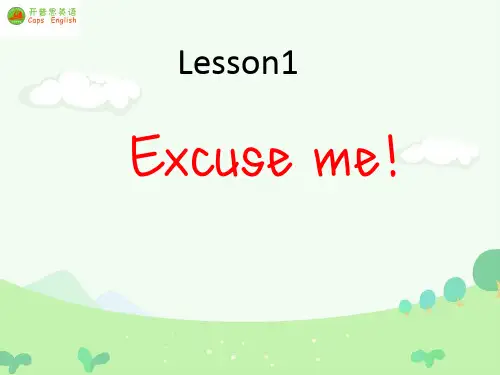
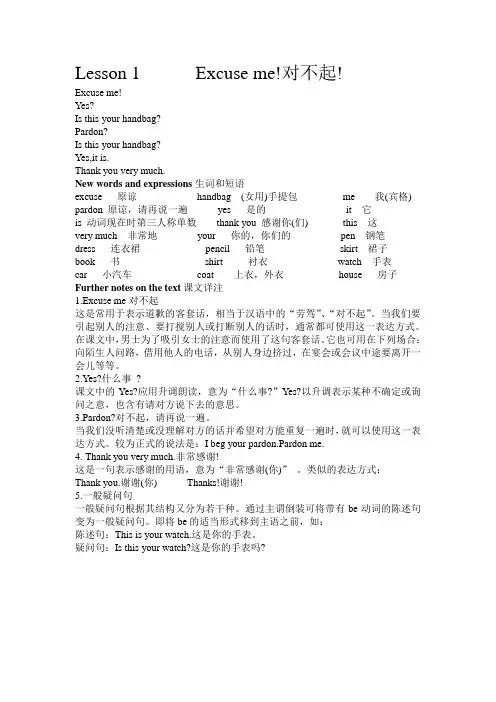
Lesson 1 Excuse me!对不起!Excuse me!Yes?Is this your handbag?Pardon?Is this your handbag?Yes,it is.Thank you very much.New words and expressions生词和短语excuse 原谅handbag (女用)手提包me 我(宾格) pardon 原谅,请再说一遍yes 是的it 它is 动词现在时第三人称单数thank you 感谢你(们) this 这very much 非常地your 你的,你们的pen 钢笔dress 连衣裙pencil 铅笔skirt 裙子book 书shirt 衬衣watch 手表car 小汽车coat 上衣,外衣house 房子Further notes on the text课文详注1.Excuse me对不起这是常用于表示道歉的客套话,相当于汉语中的“劳驾”、“对不起”。
当我们要引起别人的注意、要打搅别人或打断别人的话时,通常都可使用这一表达方式。
在课文中,男士为了吸引女士的注意而使用了这句客套话。
它也可用在下列场合:向陌生人问路,借用他人的电话,从别人身边挤过,在宴会或会议中途要离开一会儿等等。
2.Yes?什么事?课文中的Yes?应用升调朗读,意为“什么事?”Yes?以升调表示某种不确定或询问之意,也含有请对方说下去的意思。
3.Pardon?对不起,请再说一遍。
当我们没听清楚或没理解对方的话并希望对方能重复一遍时,就可以使用这一表达方式。
较为正式的说法是:I beg your pardon.Pardon me.4.Thank you very much.非常感谢!这是一句表示感谢的用语,意为“非常感谢(你)”。
类似的表达方式:Thank you.谢谢(你) Thanks!谢谢!5.一般疑问句一般疑问句根据其结构又分为若干种。
通过主谓倒装可将带有be动词的陈述句变为一般疑问句。
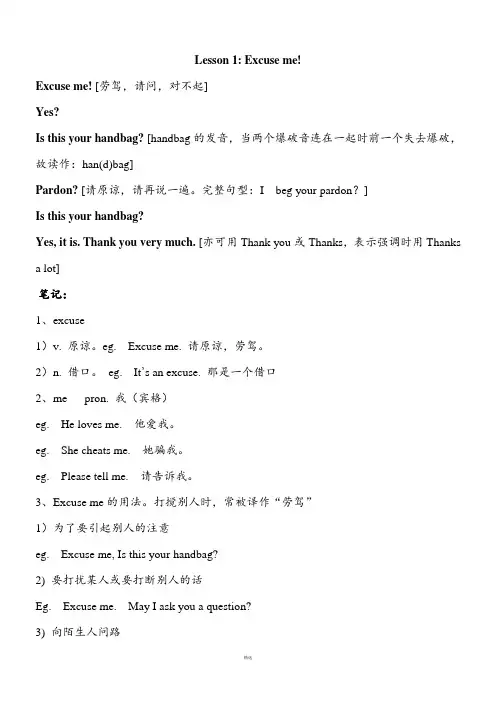
Lesson 1: Excuse me!Excuse me! [劳驾,请问,对不起]Yes?Is this your handbag? [handbag的发音,当两个爆破音连在一起时前一个失去爆破,故读作:han(d)bag]Pardon? [请原谅,请再说一遍。
完整句型:I beg your pardon?]Is this your handbag?Yes, it is. Thank you very much. [亦可用Thank you或Thanks,表示强调时用Thanks a lot]笔记:1、excuse1)v. 原谅。
eg. Excuse me. 请原谅,劳驾。
2)n. 借口。
eg. It’s an excuse. 那是一个借口2、me pron. 我(宾格)eg. He loves me. 他爱我。
eg. She cheats me. 她骗我。
eg. Please tell me. 请告诉我。
3、Excuse me的用法。
打搅别人时,常被译作“劳驾”1)为了要引起别人的注意eg. Excuse me, Is this your handbag?2) 要打扰某人或要打断别人的话Eg. Excuse me. May I ask you a question?3) 向陌生人问路Eg. Excuse me. Could you please tell me the way to the railway station? 劳驾,请问去火车站的路怎么走呢?4) 向某人借东西Eg. Excuse me. Can I borrow your pen? 打扰下,可不可以接你的钢笔用下啊?5)需要从别人身边挤过或让别人给自己让路Eg. Excuse me. Could you please make some room for me? 劳驾,借过下一下。
6)要求在宴会或会议中途中离开一会儿Eg. Excuse me. May I leave for a little while? 对比起,我离开一下。
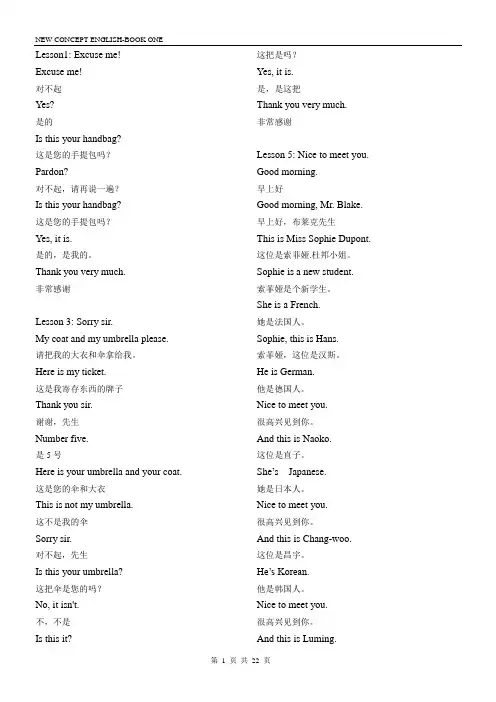
Lesson1: Excuse me!Excuse me!对不起Yes?是的Is this your handbag?这是您的手提包吗?Pardon?对不起,请再说一遍?Is this your handbag?这是您的手提包吗?Yes, it is.是的,是我的。
Thank you very much.非常感谢Lesson 3: Sorry sir.My coat and my umbrella please.请把我的大衣和伞拿给我。
Here is my ticket.这是我寄存东西的牌子Thank you sir.谢谢,先生Number five.是5号Here is your umbrella and your coat. 这是您的伞和大衣This is not my umbrella.这不是我的伞Sorry sir.对不起,先生Is this your umbrella?这把伞是您的吗?No, it isn't.不,不是Is this it? 这把是吗?Yes, it is.是,是这把Thank you very much.非常感谢Lesson 5: Nice to meet you. Good morning.早上好Good morning, Mr. Blake. 早上好,布莱克先生This is Miss Sophie Dupont. 这位是索菲娅.杜邦小姐。
Sophie is a new student.索菲娅是个新学生。
She is a French.她是法国人。
Sophie, this is Hans.索菲娅,这位是汉斯。
He is German.他是德国人。
Nice to meet you.很高兴见到你。
And this is Naoko.这位是直子。
She’s Japanese.她是日本人。
Nice to meet you.很高兴见到你。
And this is Chang-woo.这位是昌宇。
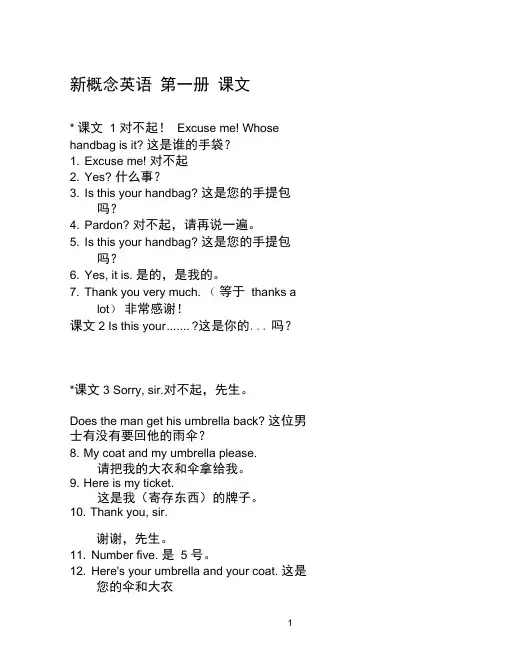
新概念英语第一册课文* 课文 1 对不起!Excuse me! Whose handbag is it? 这是谁的手袋?1. Excuse me! 对不起2. Yes? 什么事?3. Is this your handbag? 这是您的手提包吗?4. Pardon? 对不起,请再说一遍。
5. Is this your handbag? 这是您的手提包吗?6. Yes, it is. 是的,是我的。
7. Thank you very much. (等于thanks alot)非常感谢!课文2 Is this your ....... ?这是你的... 吗?*课文3 Sorry, sir.对不起,先生。
Does the man get his umbrella back? 这位男士有没有要回他的雨伞?8. My coat and my umbrella please.请把我的大衣和伞拿给我。
9. Here is my ticket.这是我(寄存东西)的牌子。
10. Thank you, sir.谢谢,先生。
11. Number five. 是 5 号。
12. Here's your umbrella and your coat. 这是您的伞和大衣13. This is not my umbrella. 这不是我的伞。
14. Sorry, sir. 对不起,先生。
15. Is this your umbrella? 这把伞是您的吗?16. No, it isn't. 不,不是!17. Is this it? 这把是吗?18. Yes, it is. 是,是这把19. Thank you very much. 非常感谢。
*课文4 Is this your ....... ?这是你的.. 吗? *课文 5 Nice to meet you. 很高兴见到你。
Is Chang-woo Chinese ? 昌宇是中国人吗?20. Good morning.早上好。
Lesson 1 Excuse me!对不起!Listen to the tape then answer this question. Whose handbag is it?听录音,然后回答问题,这是谁的手袋?Excuse me!Yes?Is this your handbag?Pardon?Is this your handbag?Yes, it is.Thank you very much.New Word and expressions 生词和短语excusev. 原谅mepron.我(宾格)yesadv. 是的isv. be 动词现在时第三人称单数thispron.这yourpossessive adjective 你的,你们的handbagn. (女用)手提包pardonint. 原谅,请再说一遍itpron.它thank you感谢你(们)very much非常地参考译文对不起什么事?这是您的手提包吗?对不起,请再说一遍。
这是您的手提包吗?是的,是我的。
非常感谢!自学导读Excuse me!这是常用于表示道歉的客套话,相当于汉语中的"劳驾"、"对不起"。
当我们要引起别人的注意、要打搅别人或打断别人的话时,通常都可使用这一表达方式。
在课文中,男士为了吸引女士的注意而使用了这句客套话。
它也可用在下列场合:向陌生人问路,借用他人的电话,从别人身边挤过,在宴席或会议中途要离开一会儿等等。
2.Yes?什么事?课文中的Yes?应用升调朗读,意为:"什么事?"Yes?以升调表示某种不肯定或询问之意,也含有请对方说下去的意思。
3.Pardon?对不起,请再说一遍。
当我们没听清或没理解对方的话并希望对方能重复一遍时,就可以使用这一表达方式。
较为正式的说法是:I beg your pardon.I beg your pardon?Pardon me.它们在汉语中的意思相当于"对不起,请再说一遍"或者"对不起,请再说一遍好吗?" 4.Thank you very much.非常感谢!这是一句表示感谢的用语,意为"非常感谢(你)"。
朗格教育高效英语学习中心新概念英语第1册英汉互译Lesson 1 Excuse me1excuse2我3是的 4 v.be动词现在时第三人称单数5your 6 (女用)手提包7pardon8它9感谢你(们)10 钢笔11 铅笔12 book13 watch 14 coat15 连衣裙16 skirt17衬衣18小汽车29 house1. 这是您的手提包吗?2.对不起! 什么事?3.是的,是我的4.这是您的手提包吗?5.这是您的手提包吗?6.非常感谢!7.对不起,请再说一遍?Lesson 3 Sorry, sir.1伞 2 please3这里 4 my 5 票 6 number 7 五8 对不起的9 sir 10 衣帽存放处11一套衣服12 school13 老师14 son 15 女儿1.这是我(寄存东西)的牌子。
2.是5号。
3.这是您的伞和大衣4.这不是我的伞5.对不起,先生。
6.这把伞是您的吗?7.不,不是!8.请把我的大衣和伞拿给我。
9.这把是吗?10.是,是这把11.非常感谢。
12.谢谢,先生Lesson 5 Nice to meet you1 先生2 好3 morning4 Miss5 新的6 学生7 French 8 German9 美好的10 遇见11 日本人12 Korean 13 中国人14 ad.也15(产品的)牌号16 Swedish 17 English 18 American 19 Italian 20Volvo 21标致22Mercedes 23丰田24 Daewoo 25 迷你26 福特27 Fiat1.这位是索菲娅.杜邦小姐。
2.索菲娅,这位是汉斯。
他是德国人。
3.这位是直子。
她是日本人。
4.索菲娅是个新学生。
她是法国人。
5.这位是昌宇。
他是韩国人。
6.很高兴见到你。
7.这位是鲁明。
他是中国人。
8.早上好,布莱克先生9. 这位是晓惠。
她也是中国人。
Lesson 7 Are you a teacher?1 I2 动词现在时第一人称单数3 动词现在时复数4 name5 what6 nationality7 工作8 电脑键盘9 operator10 工程师11 policeman 12 女警察13 出租汽车司机14 空中小姐15 邮递员16 护士17 机械师18 理发师1朗格教育高效英语学习中心19 家庭妇女20 送牛奶的人1你是做什么工作的? 2.很高兴见到你。
新概念英语第一册Lesson 1 Excuse me! 对不起!Excuse me!对不起!Yes? 什么事?Is this your handbag? 这是您的手提包吗?Pardon? 对不起,请再说一遍。
Is this your handbag? 这是您的手提包吗?Yes,it is. 是的,是我的。
Thank you very much. 非常感谢!New words and expressions 生词和短语excuse v.原谅handbag n. (女用)手提包me pron.我(宾格) pardon int.原谅,请再说一遍yes adv.是的it pron.它is be 动词现在时第三人称单数thank you 感谢你(们) this pron.这very much 非常地your possessive adjective 你的,你们的Notes on the text 课文注释1.Excuse me.这个短语常用于与陌生人搭话,打断别人的说话或从别人身边挤过。
在课文中,男士为了吸引女士的注意力而用了这个表示客套的短语。
2.Pardon?全句为I beg your pardon. 意思是请求对方把刚才讲过的话重复一遍。
Lesson 3 Sorry, sir. 对不起,先生。
My coat and my umbrella please. 请把我的大衣和伞拿给我。
Here is my ticket. 这是我(寄存东西)的牌子。
Thank you, sir. 谢谢,先生。
Number five. 是5号。
Here's your umbrella and your coat. 这是您的伞和大衣。
This is not my umbrella. 这不是我的伞。
Sorry, Sir. 对不起,先生。
Is this your umbrella? 这把伞是您的吗?No, it isn't. 不,不是!Is this it? 这把是吗?Yes, it is. 是,是这把。
Lesson 1: Excuse me!Excuse me! [劳驾,请问,对不起]Yes?Is this your handbag? [handbag的发音,当两个爆破音连在一起时前一个失去爆破,故读作:han(d)bag]Pardon? [请原谅,请再说一遍。
完整句型:I beg your pardon?]Is this your handbag?Yes, it is. Thank you very much. [亦可用Thank you或Thanks,表示强调时用Thanks a lot]笔记:1、excuse1)v. 原谅。
eg. Excuse me. 请原谅,劳驾。
2)n. 借口。
eg. It’s an excuse. 那是一个借口2、me pron. 我(宾格)eg. He loves me. 他爱我。
eg. She cheats me. 她骗我。
eg. Please tell me. 请告诉我。
3、Excuse me的用法。
打搅别人时,常被译作“劳驾”1)为了要引起别人的注意eg. Excuse me, Is this your handbag?2) 要打扰某人或要打断别人的话Eg. Excuse me. May I ask you a question?3) 向陌生人问路Eg. Excuse me. Could you please tell me the way to the railway station? 劳驾,请问去火车站的路怎么走呢?4) 向某人借东西Eg. Excuse me. Can I borrow your pen? 打扰下,可不可以接你的钢笔用下啊?5)需要从别人身边挤过或让别人给自己让路Eg. Excuse me. Could you please make some room for me? 劳驾,借过下一下。
6)要求在宴会或会议中途中离开一会儿Eg. Excuse me. May I leave for a little while? 对比起,我离开一下。